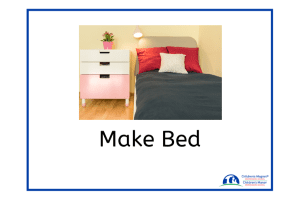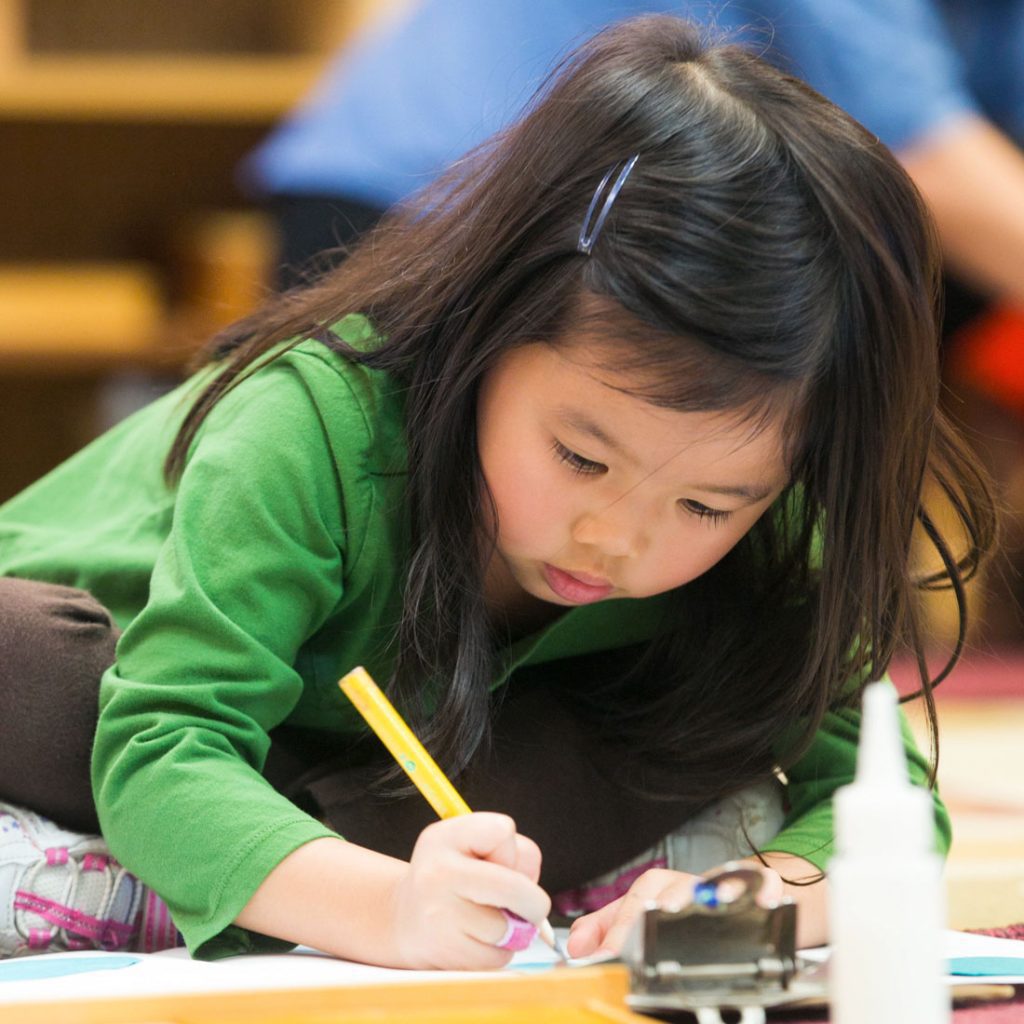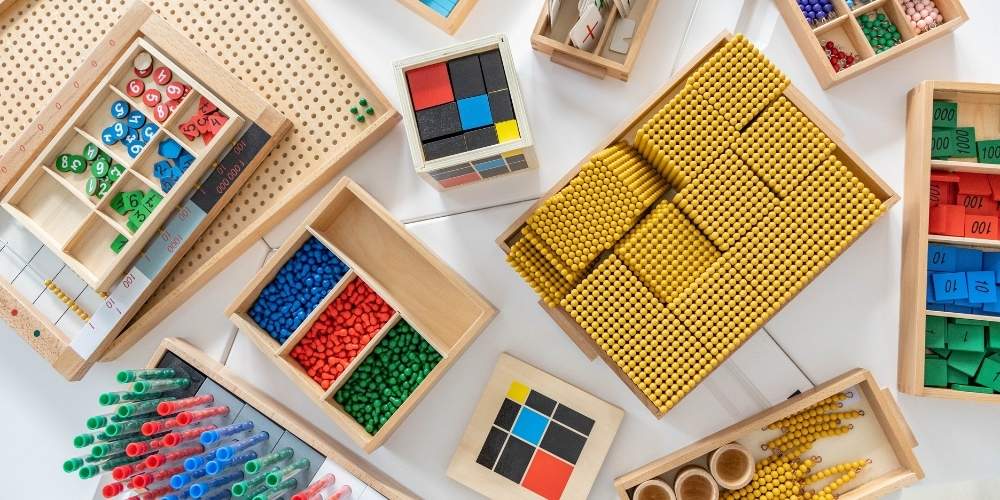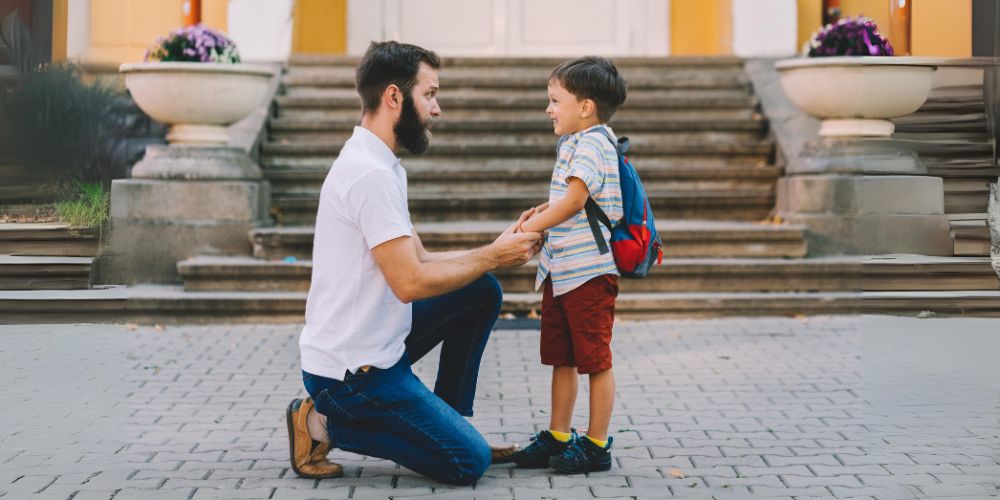Kindergarten, even for children who have attended preschool or daycare, is considered the official beginning of a child’s academic journey. Preparing your child for Kindergarten early on will help set them up for success in their crucial
Fostering Independence
The Kindergarten environment will encourage your child to take ownership of their own education. To help your child foster independence, allow them to participate in household tasks such as clearing their own dishes, or putting on their own shoes without assistance. If they struggle, give them the space to problem solve before interfering and doing it for them. It may take longer, and create a few messes, but their growth and perseverance is invaluable.1



Practical Life
As their independence evolves, your child will be able to master practical life skills. Some of the primary skills that will be highlighted in the classroom are completing self care tasks as well as taking care of their surroundings. From putting on their own clothing to setting the table for dinner or caring for plants at home, your child should be learning to navigate their day without assistance. Beyond everyday tasks at home, you can give your child responsibility in a variety of ways, such as, filling up water bottles, bringing clothes to the laundry room, or feeding the family pet.2 All of these not only work on independence, but also fine motor skills. Try utilizing our age-appropriate routine cards to foster your child’s ownership over their responsibilities.Social & Emotional Maturity
Kindergarten will bring your child into a whole new social circle filled with different personalities. Exposing your child to family, friends and neighbors while teaching them to play independently and cooperatively in their preschool years will be important to develop social maturity. Teaching your child to share toys or having meals with other children will be an important part of their social maturation as they prepare for Kindergarten. Encourage emotional intelligence at home by helping your child identify their emotions as they express them. While it is tempting to minimize feelings of frustration, sadness, and anger, the acknowledgement of these feelings will avoid creating associations between these negative emotions and feeling ignored. Likewise, help your child identify the things that give them positive feelings in order to reinforce emotion recognition. The simplest approach to modeling emotional intelligence is to model self-regulation as a parent. For example, if frustration gets the best of you, take the time to explain to your child how you are feeling and how you could have better expressed yourself.3Academic Preparedness
Academic preparedness in the preschool years is critical before your child steps into their Kindergarten classroom. Children, specifically from the ages of 0-6 have an extraordinary disposition to learning. Maria Montessori coined the phrase “the absorbent mind” to refer to the capacity of a child’s mind to absorb information from their environment and shape their brains unconsciously. According to Montessori Philosophy, the absorbent mind allows the young child to experience periods of intense mental activity, “absorbing” learning from their environment naturally and spontaneously.


Engaging your child in activities at home to develop literacy and numeracy will prepare your child for Kindergarten success. From identifying letters of the alphabet to learning to grip a pencil to counting numbers and classifying objects and colors, there are numerous skills your child can and should work on before entering Kindergarten. That said, don’t put too much pressure on your child, or on yourself – each child learns at their own pace and should not be compared.
You can find educational opportunities all around us in places like museums, zoos, parks, and libraries. Organic learning opportunities can promote your child’s readiness to learn within the classroom.
Benefits of a Montessori Education for Kindergarten Readiness
The Montessori system of education is a child centered method of education that nurtures the child’s natural development by allowing children to work, develop, and learn at their own individual pace. Guided by qualified teachers in a carefully prepared classroom environment, children are encouraged to become independent, develop social/emotional maturity, learn academic skills through hands-on activities and cultivate a love of learning. This holistic approach of the Montessori method begins as early as toddler age and can give your child a head start for Kindergarten and elementary school years.
One of the key goals of Montessori education is to foster independence in children. With teachers acting as guides, children are given the freedom to choose learning activities, work independently at their own pace and assess their own learning progress. In Montessori, fostering independence is an ongoing process that begins in the preschool years. As children learn to pour water, put on their own shoes or clean their workspace, they gradually become more confident and independent.
Practical Life is one of the five Montessori learning areas and encompasses the activities of everyday life. The exercises of Practical Life are central to the Montessori method and involve care of self, care of the environment, grace and courtesy, and control of movement. From an early age, children in a Montessori classroom learn, practice, and master activities such as handwashing, learning how to lace, washing a table, peeling vegetables, taking care of plants, greeting someone, learning manners, body coordination and control).
Developing social/emotional maturity is an important aspect of Montessori education and is developed in a myriad of ways from mixed-age classrooms to small group learnings (called circle time) to the lessons in Grace and Courtesy (Practical Life). Mixed age classrooms are a signature element of a Montessori school and help children develop emotional and social maturity. Older children learn to help their younger peers and become role models, while younger children learn new concepts from the older child.
The Montessori method lays a very strong foundation for academic preparation from the early years. Using hands-on materials and emphasizing higher order thinking, children in a Montessori environment are introduced to language, mathematics, geography, culture and science in an advanced, interdisciplinary way. This instills in children a love for learning at an early age and prepares them for educational success. To learn more about the Montessori curriculum, click here.
Is your Child Ready?
Ultimately, Kindergarten readiness will present itself in a variety of ways. Each child is different and will take their own journey in their preparation for Kindergarten. Rather than trying to maximize your child’s readiness in all areas, encourage them to learn from their peers. Your child’s classroom will be full of students with varying strengths, and at CMMS, we recognize that those differences should be celebrated. As they approach Kindergarten-age, continue to assess your child’s independence, practical skills, and overall preparedness. We’re here to help get your child ready for Kindergarten and beyond with our Pre-Primary Program (ages 2-4) and our Primary Program (3.5-6). Interested in our Kindergarten Program? Learn more!





